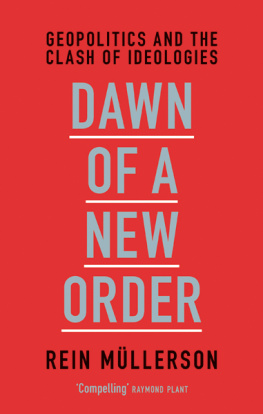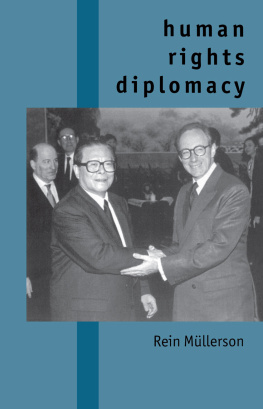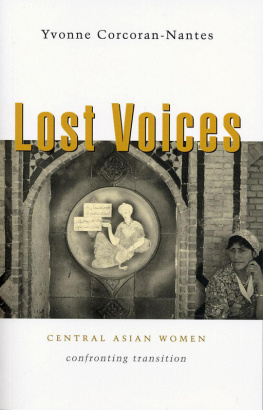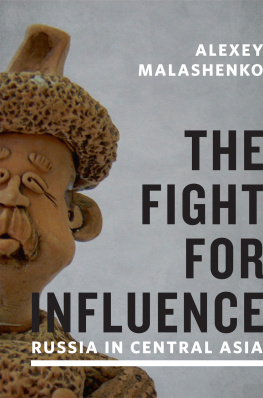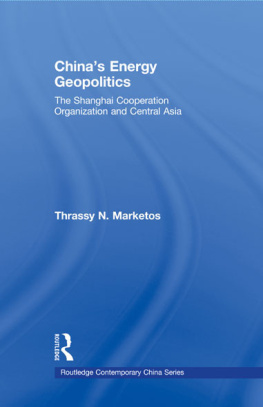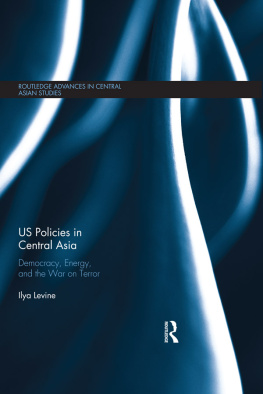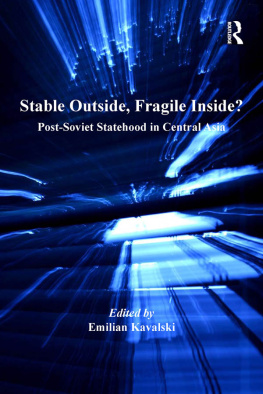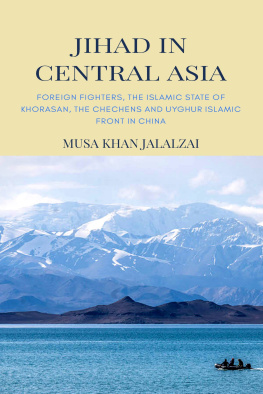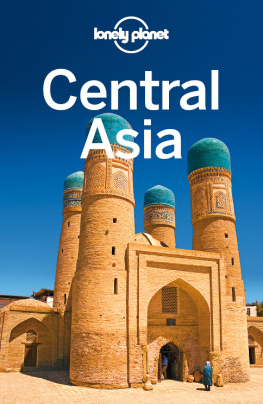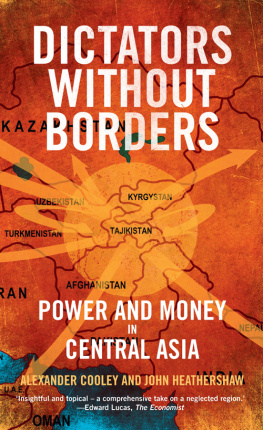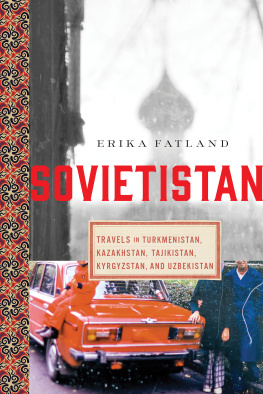
CENTRAL ASIA:
A CHESSBOARD AND PLAYER IN THE NEW GREAT GAME
Central Asia has huge oil and gas resources, divided between five independent states- Kazakhstan, Kyrgyzstan, Tajikistan, Turkmenistan, and Uzbekistan each with their own problems and interests. Situated between Russia and China and close to Afghanistan and other potential trouble-spots, the region has acquired immense geo-strategic importance. Old legacies, whether they go back to Genghis Khan or stem from the recent Soviet past, have a profound effect on contemporary issues and political choices. Concentrating on todays problems against a complex history, the book draws on the authors extensive involvement with the region. Considerable attention is paid to Islam, human rights, and Central Asias place in the war against terrorism.
www.keganpaul.com
KEGAN PAUL LIBRARY OF CENTRAL ASIA
A History of Afghanistan: Volumes I & II
Percy Sykes
The Turkic Peoples of the World
Margaret Bainbridge, editor
A Plant Hunter in Tibet
Frank Kingdon Ward
Tibetan Border Worlds: A Geohistorical Analysis of Trade and Traders
Wim Van Spengen
Islamic Peoples of the Soviet Union
Shirin Akiner
Religions of Tibet
Giuseppe Tucci
The Modern History of Mongolia
Charles Bawden
Mongolian Traditional Literature: An Anthology
Charles Bawden
Central Asia: A Chessboard and Player in the New Great Game
Rein Mllerson
CENTRAL ASIA:
A CHESSBOARD AND PLAYER IN THE NEW GREAT GAME
REIN MLLERSON
First published in 2007 by Kegan Paul Limited
Published 2013 by Routledge
2 Park Square, Milton Park, Abingdon, Oxon OX14 4RN
711 Third Avenue, New York, NY, 10017, USA
Routledge is an imprint of the Taylor & Francis Group, an informa business
Kegan Paul, 2007
All rights reserved. No part of this book may be reprinted or reproduced or utilised in any form or by any electric, mechanical or other means, now known or hereafter invented, including photocopying or recording, or in any information storage or retrieval system, without permission in writing from the publishers.
ISBN 13: 978-0-710-31316-4 (hbk)
ISBN 13: 978-0-415-54102-2 (pbk)
British Library Cataloguing in Publication Data
A catalogue record for this book is available from the British Library.
TO IRINA
CONTENTS
This book would not have been written had I not met so many interesting and fascinating people in Central Asia, many of whom have become my good friends. Quite a lot of them appear on the pages of this book, while some remain anonymous mainly for the sake of their security. I met inspiring people in high offices, among members of persecuted opposition (for example, I have known one of my interlocutors, who will appear in the book, as an inmate in a notorious jail and soon afterwards as the head of government) as well as in places such as bazaars, taxis, pastures in high mountains, chaikhanas (tea houses), at dastharkhan (literally tablecloth but meaning an hours-long feast with numerous meals and always interesting conversation) or saunas in various cities and towns. I am lucky to count as my close friends some brilliant minds of Central Asia, intellectuals, writers, poets and journalists (they, too, pop up on various pages).
I thank Kings College, London for granting me a Sabbatical to allow me to work for the United Nations in Central Asia.
I am grateful to my young research assistants, my son George Mllerson, my students Wesley Pang and Soroush Kafiabadi, who spent many hours searching for and finding various mistakes, inconsistencies and omissions.
In the middle of the huge Eurasian landmass live peoples whose known history looks like big sways of a slowly moving swing up above the horizon and then down below the nadir. Thousands of years ago nomads of these steppes, having domesticated wild horses and learned to use the iron bit and stirrups made of the same metal started to conquer new lands without meeting significant geographic obstacles such as high mountain ranges or impenetrable deserts. If the iron bit was immensely helpful in steering their horses over vast distances, stirrups allowed horsemen to send their arrows from a relatively steady position in the saddle. These inventions brought about a kind of militarytechnological revolution that for a long time changed the correlation of forces in the Eurasian continent. Soon, not only their immediate neighbours but even faraway peoples became awed by the military prowess and ruthlessness of these nomads of the steppes. Attila the Hun, Genghis Khan and Timur (Tamerlane) are the most famous or, depending on where you have learned your history lessons, most infamous leaders of these Central Asian peoples.
When the Great Silk Road linking the Greek and Roman Empires in the West and Chinese and Indian Empires in the East started to meander through these lands the rest of the world learned more about the tribes that lived in the middle of this most important trade route, though in Western lands the scientific and cultural achievements of these peoples were, and unfortunately still remain, somewhat underestimated. Today, in the West, as in Central Asia though for different reasons, Genghis Khan or Tamerlane are having more publicity than, for example, al-Biruni (Albiruni), ibn Sina (Avicenna) or Omar Khayyam. Vicious things not only horrify but also fascinate us; people love narratives about heroes or villains; such stories titillate their senses and, as one mans villain is often another mans hero, there are more books about such heroesvillains than they may deserve; at the same time, those who may have much more positively contributed to the advancement of civilization remain unrewarded also by historians and writers.
After a swing moves up, it has to come down. This seems to be a law not only in physical, but also in the human and social world. No empire has been eternal, no dominance has lasted forever and no relative or absolute advantage has been permanent. It may be even one of the few regular patterns of world affairs that the more glorious is a societys past, the less satisfactory is its present and the less promising looks its future. Is not it because of this regularity that quite a few societies that fail to successfully compete in todays world try to compensate for it by references to their magnificent past or even return to it? In such a case ones glorious history may indeed be of disadvantage and even become an obstacle for progress.
Decline came eventually also to peoples of what is today called either Central Asia, Middle Asia (this term was often used in the former Soviet Union), Central Eurasia or even Inner Asia. Maritime navigation substituted for land trade routes; scientific and technological revolutions based on developments such as the Renaissance and Enlightenment as well as the secularization of social life in one part of the world more or less coincided with closing societies as well as minds in other parts of the world. Since the beginning of the sixteenth century the balance of power in the world started to change rapidly; among those who remained behind were also Central Asian peoples. There were, of course, other reasons for such a change in the fortune of regions and peoples. Colonialism certainly played a negative role though, as we will discuss in this book, at least in that region not all of its effects were necessarily harmful. Moreover, colonialism alone can seldom be an explanation for somebodys grievances and problems. There had to be, in the first place, something that made some nations or regions stronger and more vibrant, allowing them to impose their will on others. Greed, ruthlessness and even the burning desire to take up white mans burden are not sufficient for the explanation of colonialism. Weak and small nations have not been less greedy or ruthless; their peacefulness has often been more imposed by external circumstances than voluntarily chosen because of internal characteristics of these societies. Why from the thirteenth century onwards did Genghis Khan and his successors conquer Russia, but less than half a millennium later it was Russia which had not only re-conquered lands lost to the Mongols, but started to colonize territories that had previously been domains of Central Asian emperors? Even the birthplace of the Conqueror of the World, though never formally included in the Russian (Soviet) Empire, fell under the Russian dominance. Be as it may, Central Asian nations gradually were eclipsed from the world political maps as subjects of history; they rather became objects in other nations great or not so great games.


